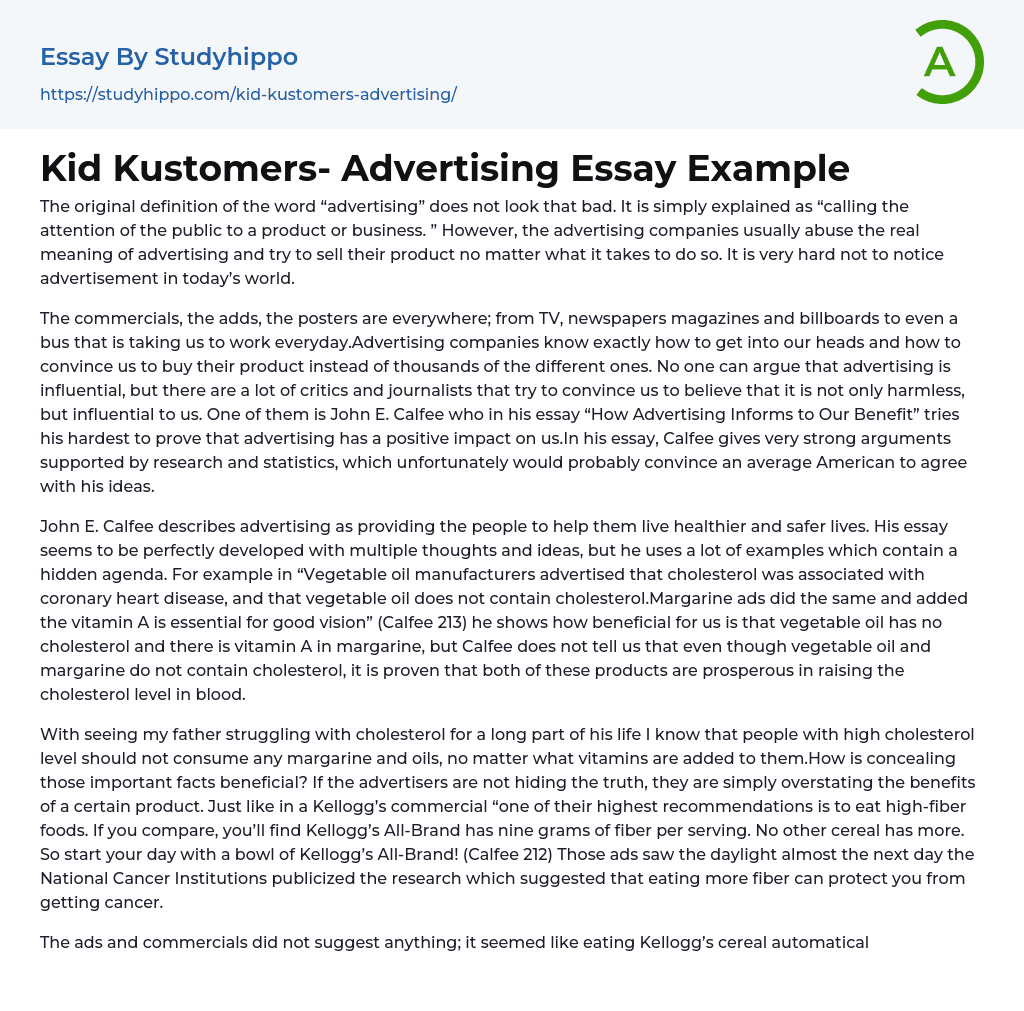Although the original intention of "advertising" was simply to draw attention to a product or company, advertising agencies often manipulate its definition in order to increase sales by any means necessary. Consequently, advertisements have become an unavoidable part of contemporary existence.
Advertising is ubiquitous, spanning from television to billboards even on our daily commute. Despite its undeniable influence, critics and journalists attempt to downplay its capacity to persuade individuals. An advocate for advertising, John E. Calfee, argues in his essay "How Advertising Informs to Our Benefit" that advertising can have a beneficial impact. His essay offers compelling evidence drawn from research and statistics, which may sway the opinions of the general public.
John E. Calfee argues that advertising has the potential to improve people's health and safety, but his essay contains examples that are biased. Specifically, he u
...ses vegetable oil and margarine advertisements as an example of how they promote not having cholesterol while including vitamin A. However, research demonstrates that both products can increase cholesterol levels in the blood.
Having observed my father struggle with high cholesterol levels, I believe that individuals in similar situations should avoid margarine and oils, even if they contain added vitamins. It is worrying that crucial information can sometimes be concealed from the public. Advertisers may also exaggerate the benefits of certain products, as demonstrated by Kellogg's All-Brand cereal commercial promoting its high fiber content. This ad was released shortly after research showed that increasing fiber intake could help prevent cancer. The commercial encourages viewers to begin their day with a bowl of Kellogg's All-Brand cereal containing nine grams of fiber per serving - more than any other cereal.
The implication o
the Kellogg's ads and commercials was that consuming the cereal product would prevent cancer. In his essay, Calfee avoided mentioning McDonald's, a highly controversial and heavily advertised fast food company, as it is known for exceeding commercial limits. Despite knowing that fast food is unhealthy, these companies use advertising to persuade consumers to purchase their products regardless.
Although fast food chains like McDonald's are popular and easily accessible, they are known to have adverse health effects despite their taste and convenience. Michael Moore's thirty-day diet consisting solely of McDonald's food in the documentary "Supersize Me" demonstrated these effects by causing him to gain twenty-four pounds within a month due to the unhealthy ingredients used.
Merely a surface-level indication, the weight gain present was caused by toxic liver, escalated cholesterol levels, decreased sex drive and intense headaches and despondency. If the product is not advantageous, then advertising's efficacy cannot be deemed worthwhile. McDonald's may have been unimportant sans advertisements but has emerged as one of the most triumphant corporations internationally owing to their employment of it. Despite its existence for many years now, advertising has gradually become increasingly unethical and excessive in recent times.
As time has passed, advertisements and commercials have transformed into invasive forms such as spam, junk mail, and intrusive phone calls that disrupt our personal lives. The rivalry between advertising companies has intensified to the extent that they employ deceitful tactics, unethical behavior, and manipulation to promote their products. Despite persuasive essays and articles advocating against this trend like Calfee's work, the advertising industry persists in having a profound influence on our decisions related to consumption and fashion choices which ultimately shape our identities.
The power
it holds, should it truly possess it?
- Sales Promotion essays
- Advertising campaign essays
- Food Safety essays
- Food Security essays
- Beverages essays
- Cuisines essays
- Dairy essays
- Desserts essays
- Fast Food essays
- Bread essays
- Meal essays
- Meat essays
- Organic Food essays
- Rice essays
- Sugar essays
- Taste essays
- Beef essays
- Coconut essays
- Crowd essays
- Dinner essays
- Juice essays
- Sainsbury essays
- Cooking essays
- Ginger essays
- Oreo essays
- Drink essays
- Beer essays
- Wine essays
- Coffee essays
- Tea essays
- Cake essays
- Hamburger essays
- Ice Cream essays
- Burger essays
- Pizza essays
- Fruit essays
- Lemon essays
- Food Waste essays
- Favorite Food essays
- Alcoholic essays
- Soft Drinks essays
- Cookie essays
- Starch essays
- Yeast essays
- Cola essays
- Pizza Hut essays
- snack foods essays
- chips essays
- Biscuit essays
- Brewing essays




